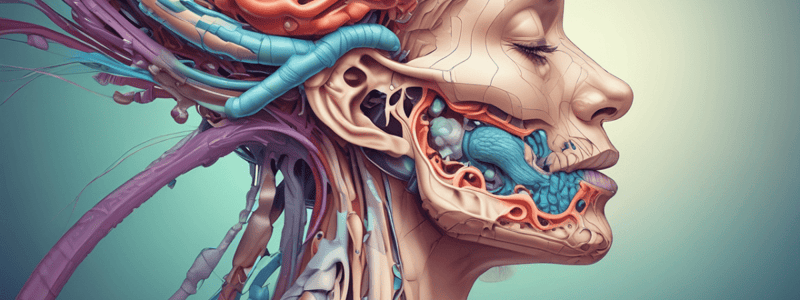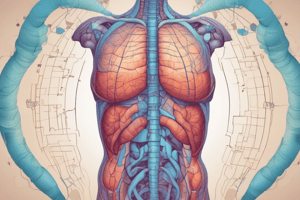Podcast
Questions and Answers
What is a manifestation of thyroid hyperfunction in the cardiovascular system?
What is a manifestation of thyroid hyperfunction in the cardiovascular system?
- Decreased force of cardiac contractions
- Decreased cardiac output
- Bradycardia
- Increased rate and force of cardiac contractions (correct)
Which of the following is a gastrointestinal manifestation of thyroid hyperfunction?
Which of the following is a gastrointestinal manifestation of thyroid hyperfunction?
- Decreased peristalsis
- Decreased appetite
- Increased appetite (correct)
- Nausea and vomiting
A patient with thyroid hyperfunction is experiencing a rapid pulse. What is the most likely reason for this?
A patient with thyroid hyperfunction is experiencing a rapid pulse. What is the most likely reason for this?
- Decreased cardiac output
- Increased parasympathetic nervous system activity
- Decreased sympathetic nervous system activity
- Increased rate and force of cardiac contractions (correct)
A patient with thyroid hyperfunction is experiencing weight loss. What is the most likely reason for this?
A patient with thyroid hyperfunction is experiencing weight loss. What is the most likely reason for this?
What is a common manifestation of thyroid hyperfunction that can be mistaken for another condition?
What is a common manifestation of thyroid hyperfunction that can be mistaken for another condition?
What is the primary cause of thyrotoxicosis in patients with preexisting hyperthyroidism?
What is the primary cause of thyrotoxicosis in patients with preexisting hyperthyroidism?
Which of the following symptoms is NOT typically associated with acute thyrotoxicosis?
Which of the following symptoms is NOT typically associated with acute thyrotoxicosis?
What is the primary goal of treatment in acute thyrotoxicosis?
What is the primary goal of treatment in acute thyrotoxicosis?
Which laboratory test is used to confirm the diagnosis of thyrotoxicosis?
Which laboratory test is used to confirm the diagnosis of thyrotoxicosis?
What is the primary purpose of the radioactive iodine uptake (RAIU) test in thyroid disorders?
What is the primary purpose of the radioactive iodine uptake (RAIU) test in thyroid disorders?
What is the primary characteristic of hyperthyroidism?
What is the primary characteristic of hyperthyroidism?
Which of the following is NOT a common cause of hyperthyroidism?
Which of the following is NOT a common cause of hyperthyroidism?
Which age group is most affected by hyperthyroidism?
Which age group is most affected by hyperthyroidism?
What is the term for hypermetabolism caused by excess circulating levels of thyroid hormones?
What is the term for hypermetabolism caused by excess circulating levels of thyroid hormones?
What is a potential risk factor for developing hyperthyroidism?
What is a potential risk factor for developing hyperthyroidism?
What is the primary cause of exophthalmos in patients with thyroid disorders?
What is the primary cause of exophthalmos in patients with thyroid disorders?
What is the rare and severe condition that occurs when excess amounts of thyroid hormones are released into the circulation?
What is the rare and severe condition that occurs when excess amounts of thyroid hormones are released into the circulation?
What is the consequence of the eyelids not closing completely in patients with thyroid disorders?
What is the consequence of the eyelids not closing completely in patients with thyroid disorders?
What is the result of ocular muscle changes in patients with thyroid disorders?
What is the result of ocular muscle changes in patients with thyroid disorders?
What is the importance of early treatment in acute thyrotoxicosis?
What is the importance of early treatment in acute thyrotoxicosis?
What is the primary mechanism by which antibodies contribute to the development of Graves' disease?
What is the primary mechanism by which antibodies contribute to the development of Graves' disease?
What is a potential long-term consequence of untreated Graves' disease?
What is a potential long-term consequence of untreated Graves' disease?
Which of the following factors is NOT a known risk factor for developing Graves' disease?
Which of the following factors is NOT a known risk factor for developing Graves' disease?
What is the primary effect of excess thyroid hormones on the body?
What is the primary effect of excess thyroid hormones on the body?
What is the typical progression of symptoms in a patient with Graves' disease?
What is the typical progression of symptoms in a patient with Graves' disease?
Flashcards are hidden until you start studying
Study Notes
Thyroid Hyperfunction
-
Cardiovascular system manifestations:
- Increased blood pressure
- Increased rate and force of cardiac contractions
- Bounding, rapid pulse
- Increased cardiac output
- Systolic murmurs
- Dysrhythmias
- Palpitations
- Angina
-
Gastrointestinal system manifestations:
- Increased appetite
- Increased thirst
- Weight loss
- Increased peristalsis
Thyrotoxicosis
- Thought to result from stressors (e.g., infection, trauma, surgery) in a patient with preexisting hyperthyroidism
- Patients having a thyroidectomy are at risk due to manipulation of the hyperactive thyroid gland
- Symptoms of hyperthyroidism are severe and prominent
- Manifestations include:
- Severe tachycardia
- Heart failure
- Shock
- Hyperthermia (up to 106°F [41.1°C])
- Agitation
- Delirium
- Seizures
- Abdominal pain
- Vomiting
- Diarrhea
- Coma
Treatment of Thyrotoxicosis
- Reducing circulating thyroid hormone levels through:
- Appropriate drug therapy
- Fever reduction
- Fluid replacement
- Elimination or management of the initiating stressors
Hyperthyroidism
- Hyperactivity of the thyroid gland with a sustained increase in synthesis and release of thyroid hormones
- Most common form: Graves' disease
- Other causes:
- Toxic nodular goiter
- Thyroiditis
- Excess iodine intake
- Pituitary tumors
- Thyroid cancer
- Occurs more frequently in women, especially those 20-40 years old
Diagnosis of Hyperthyroidism
- Confirmed with findings of:
- Decreased serum TSH levels
- Elevated free thyroxine (T4) levels
- Radioactive iodine uptake (RAIU) differentiates Graves' disease from other forms of thyroiditis
Complications of Hyperthyroidism
- Acute thyrotoxicosis (thyrotoxic crisis, thyroid storm): an acute, severe, and rare condition
- Life-threatening emergency, but death is rare with early treatment
Studying That Suits You
Use AI to generate personalized quizzes and flashcards to suit your learning preferences.



